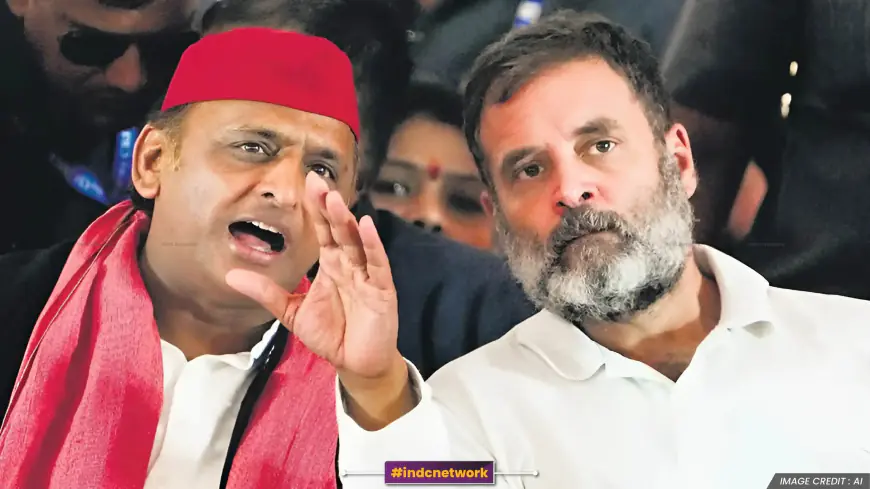UP Congress Draws Line: No By-Election Contest Without Favorable Deal, Aims to Correct Akhilesh’s Misconceptions
The Congress party in Uttar Pradesh has refused to contest upcoming by-elections without securing what it considers "respectable" seats in its alliance with the Samajwadi Party (SP). Tensions have risen as Congress pushes for constituencies where it has a better chance of winning, instead of the less favorable seats offered by SP. Congress' UP President, Ajay Rai, has escalated the issue to the party's high command, emphasizing the need for a stronger position. As the Congress and SP leadership navigate the seat-sharing standoff, underlying tensions involve the perception of credit for previous electoral successes and the long-term impact on future elections in both UP and Maharashtra.

INDc Network : Uttar Pradesh : A new chapter in Uttar Pradesh politics is unfolding as the Congress party draws a firm line regarding its participation in the state's upcoming by-elections. Congress, led by UP President Ajay Rai, has made it clear that it will only contest these elections if the party is allocated seats where it stands a strong chance of winning. As of now, Congress has backed out of the by-elections for nine seats, citing dissatisfaction with the current seat-sharing arrangement with the Samajwadi Party (SP).
The Congress-SP alliance has been a central strategy for both parties in recent elections, but disagreements have emerged regarding which seats Congress should contest. SP, under Akhilesh Yadav’s leadership, has offered Congress the Ghaziabad and Khair assembly seats. However, Congress is pushing for five other seats, including Sisamau, Phulpur, and Majhawan, citing a better chance of winning in these regions.
According to Congress sources, the problem with contesting Ghaziabad and Khair is that Congress has not had electoral success in these areas for a long time. Even if it does contest these seats, the likelihood of victory remains slim. On the other hand, Phulpur and Majhawan offer a better prospect, and Congress is eager to strengthen its weakening influence in these constituencies. This is the driving reason behind Congress’ increased pressure in the negotiations.
Despite the Congress' insistence, the situation is complicated for SP. Akhilesh Yadav has already declared his candidates for all nine seats, making it difficult for him to reverse those decisions without facing internal party friction. The standoff between the two parties has led to a political impasse, and the final decision will now rest with the top leadership of both Congress and SP.
Congress President Ajay Rai has made his position clear to the party high command, expressing the need to secure seats that reflect the party's stature and potential in the state. According to party insiders, if Congress does not receive the seats it is demanding, it is likely to sit out the by-elections altogether. This move is not just about the present but also about asserting Congress' strength ahead of future contests, especially the 2027 Uttar Pradesh Assembly elections.
The underlying tension in this standoff also revolves around how both parties perceive their previous successes. According to Congress leaders, Akhilesh Yadav is under the misconception that the SP-Congress alliance’s success in previous elections was entirely due to his party’s PDA (Pichda, Dalit, Alpasankhyak) equation. However, Congress believes that Rahul Gandhi's efforts to champion issues related to the Constitution, reservation, and inclusivity were equally critical in rallying backward classes, Dalits, and Muslims towards the alliance. Congress fears that if it concedes too much ground now, SP might attempt to marginalize it further in future elections.
Beyond Uttar Pradesh, there is also a strategic play underway in Maharashtra. Akhilesh Yadav is aiming to expand SP’s reach beyond UP to establish it as a national party. After a failed attempt in Haryana, Yadav has turned his attention to Maharashtra, where SP plans to contest at least a dozen seats. Congress, through its pressure in UP, is also looking to limit SP's ambitions in Maharashtra, especially to avoid a split in Muslim votes that could harm the All India Alliance's chances.
The outcome of these negotiations will not only shape the immediate future of the UP by-elections but could also have long-term implications for Congress and SP’s political standing in multiple states.
What's Your Reaction?














































































































































































